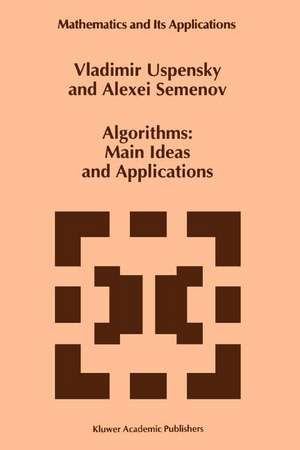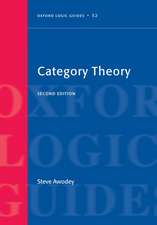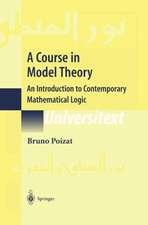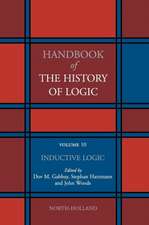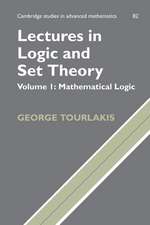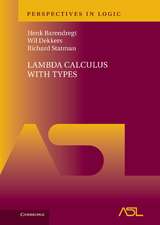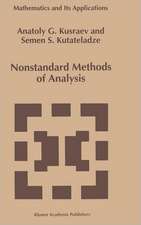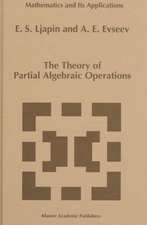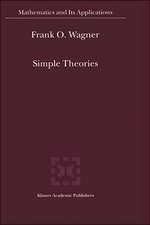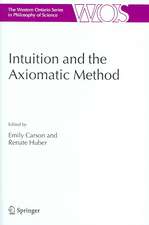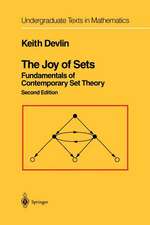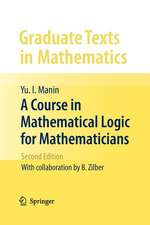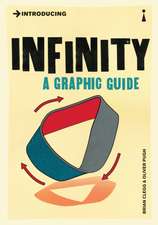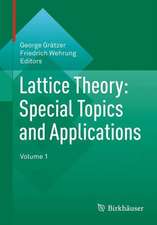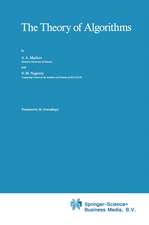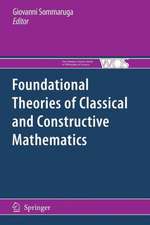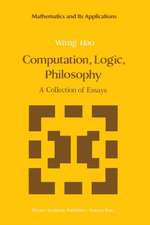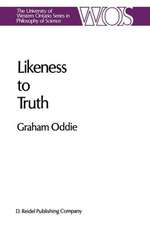Algorithms: Main Ideas and Applications: Mathematics and Its Applications, cartea 251
Autor Vladimir Uspensky, A.L. Semenoven Limba Engleză Paperback – 7 dec 2010
| Toate formatele și edițiile | Preț | Express |
|---|---|---|
| Paperback (1) | 943.88 lei 6-8 săpt. | |
| SPRINGER NETHERLANDS – 7 dec 2010 | 943.88 lei 6-8 săpt. | |
| Hardback (1) | 950.21 lei 6-8 săpt. | |
| SPRINGER NETHERLANDS – 31 mar 1993 | 950.21 lei 6-8 săpt. |
Din seria Mathematics and Its Applications
- 18%
 Preț: 945.62 lei
Preț: 945.62 lei - 15%
 Preț: 648.42 lei
Preț: 648.42 lei - 15%
 Preț: 651.99 lei
Preț: 651.99 lei - 15%
 Preț: 591.61 lei
Preț: 591.61 lei -
 Preț: 394.29 lei
Preț: 394.29 lei - 18%
 Preț: 955.56 lei
Preț: 955.56 lei - 15%
 Preț: 586.85 lei
Preț: 586.85 lei - 5%
 Preț: 655.17 lei
Preț: 655.17 lei - 15%
 Preț: 658.70 lei
Preț: 658.70 lei - 15%
 Preț: 648.56 lei
Preț: 648.56 lei - 15%
 Preț: 604.84 lei
Preț: 604.84 lei -
 Preț: 394.87 lei
Preț: 394.87 lei - 15%
 Preț: 651.84 lei
Preț: 651.84 lei -
 Preț: 374.76 lei
Preț: 374.76 lei -
 Preț: 394.51 lei
Preț: 394.51 lei - 15%
 Preț: 706.30 lei
Preț: 706.30 lei -
 Preț: 391.02 lei
Preț: 391.02 lei -
 Preț: 389.70 lei
Preț: 389.70 lei - 15%
 Preț: 585.04 lei
Preț: 585.04 lei - 15%
 Preț: 653.98 lei
Preț: 653.98 lei - 15%
 Preț: 587.02 lei
Preț: 587.02 lei - 20%
 Preț: 577.42 lei
Preț: 577.42 lei -
 Preț: 395.47 lei
Preț: 395.47 lei - 15%
 Preț: 601.88 lei
Preț: 601.88 lei - 15%
 Preț: 594.53 lei
Preț: 594.53 lei - 15%
 Preț: 651.84 lei
Preț: 651.84 lei - 15%
 Preț: 649.06 lei
Preț: 649.06 lei -
 Preț: 392.21 lei
Preț: 392.21 lei - 15%
 Preț: 649.06 lei
Preț: 649.06 lei - 15%
 Preț: 643.48 lei
Preț: 643.48 lei -
 Preț: 398.15 lei
Preț: 398.15 lei
Preț: 943.88 lei
Preț vechi: 1151.07 lei
-18% Nou
Puncte Express: 1416
Preț estimativ în valută:
180.62€ • 189.44$ • 150.36£
180.62€ • 189.44$ • 150.36£
Carte tipărită la comandă
Livrare economică 01-15 aprilie
Preluare comenzi: 021 569.72.76
Specificații
ISBN-13: 9789048142569
ISBN-10: 9048142563
Pagini: 284
Ilustrații: XII, 270 p.
Dimensiuni: 160 x 240 x 15 mm
Greutate: 0.4 kg
Ediția:Softcover reprint of hardcover 1st ed. 1993
Editura: SPRINGER NETHERLANDS
Colecția Springer
Seria Mathematics and Its Applications
Locul publicării:Dordrecht, Netherlands
ISBN-10: 9048142563
Pagini: 284
Ilustrații: XII, 270 p.
Dimensiuni: 160 x 240 x 15 mm
Greutate: 0.4 kg
Ediția:Softcover reprint of hardcover 1st ed. 1993
Editura: SPRINGER NETHERLANDS
Colecția Springer
Seria Mathematics and Its Applications
Locul publicării:Dordrecht, Netherlands
Public țintă
ResearchCuprins
Notation and Terminology.- 1.0 Preliminary notions of the theory of algorithms: constructive objects and aggregates; local properties and local actions.- 1.1 The general notion of an algorithm as an independent (separate) concept.- 1.2 Representative computational models.- 1.3 The general notion of a calculus as an independent (separate) concept.- 1.4 Representative generating models.- 1.5 Interrelations between algorithms and calculuses.- 1.6 Time and Space as complexities of computation and generation.- 1.7 Computable functions and generable sets; decidable sets; enumerable sets.- 1.8 The concept of a ?-recursive function.- 1.9 Possibility of an arithmetical and even Diophantine representation of any enumerable set of natural numbers.- 1.10 Construction of an undecidable generable set.- 1.11 Post’s reducibility problem.- 1.12 The concept of a relative algorithm, or an oracle algorithm.- 1.13 The concept of a computable operation.- 1.14 The concept of a program; programs as objects of computation and generation.- 1.15 The concept of a numbering and the theory of numberings.- 1.16 First steps in the invariant, or machine-independent, theory of complexity of computations.- 1.17 The theory of complexity and entropy of constructive objects.- 1.18 Convenient computational models.- 2.1 Investigations of mass problems.- 2.2 Applications to the foundations of mathematics: constructive semantics.- 2.3 Applications to mathematical logic: formalized languages of logic and arithmetic.- 2.4 Computable analysis.- 2.5 Numbered structures.- 2.6 Applications to probability theory: definitions of a random sequence.- 2.7 Applications to information theory: the algorithmic approach to the concept of quantity of information.- 2.8 Complexity bounds for particular problems.- 2.9 Influenceof the theory of algorithms on algorithmic practice.- Appendix. Probabilistic Algorithms (How the Use of Randomness Makes Computations Shorter).- A.1 Preliminary remarks.- A.2 Main results.- A.3 Formal definitions.- References.- Author Index.
